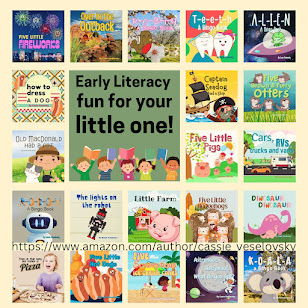Everyday Early Literacy Activities
1. Reading
Aloud: Read to your child every day. Choose colorful books with
engaging pictures and simple text. This helps them associate reading with
pleasure and helps build vocabulary. If
you and your child are not enjoying the book, then put it down and pick up a
new one. You do not have to finish a
book you do not like! (unless it is for
an assignment!)
2. Sing
Songs and Rhymes: Nursery rhymes and songs are excellent for
developing phonemic awareness—the ability to hear and identify different sounds
in words. They also teach rhythm and rhyme, which are important pre-reading
skills. Many books have been written so
that you can sing them to familiar tunes.
3. Letter
Recognition Games: Use magnetic letters or alphabet blocks to play
games where your child identifies letters. You can ask them to find specific
letters or even spell out simple words. Look for the letters (or maybe “letter of the
day”) when you’re out shopping or running errands.
4. Storytelling:
Encourage your child to tell stories, even if they are simple and short. This
helps them understand narrative structure and boosts their imagination. Use their familiar toys as storytelling prompts
or tell a story together with you each taking turns. This is really fun on a long car ride!
5. Visit
the Library: As a librarian, of course I am going to add this to the
list! Take regular trips to the library
with your child. Many libraries have storytime sessions for young children,
which often include interactive storytelling and activities.
6. Writing Activities: Provide crayons, markers, and large paper for your child to scribble and draw. One of my favorite pictures of my daughter is of her covered with washable marker. I turned my back 30 seconds! As kids get older, encourage them to try writing letters or their name, not on their own skin!
7. Word Games: Play simple word games like "I Spy" where you describe an object using its attributes ("I spy something red and round"). This helps children learn descriptive language and again, it is a fun way to pass the time on long trips. One of our favorite is the alphabet game - each person getting a letter of the alphabet in turn and having to come up with an animal. We are all sure x-ray fish are real.
8. Create
a Print-Rich Environment: There is a reason teacher's do this in the classroom! Label items around the house with words and
pictures. This helps children make connections between spoken and written
words. When you are grocery shopping,
look for the labels in the store.
9. Technology: I'm not ignoring tech. It's here to stay. Use age-appropriate educational apps or websites that focus on early literacy skills. Some apps offer interactive stories, letter tracing, and phonics games. Check your library to see if they have iPads or computers for children to use that have vetted materials.
10. Be
a Role Model: Let your child see you reading books, writing, and
enjoying language in various forms. Children often mimic what they see adults
doing.
Remember, the key is to make these activities enjoyable and not to pressure
your child. Every child develops at their own pace, so make literacy activities
a natural part of daily routines and playtime.


